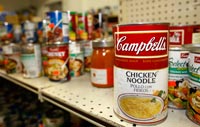Staying Fit
As soon as I enter the supermarket, I make a beeline for the dented cans and crushed boxes bin at the back of the store, followed by tours of the produce, meat and bakery departments to see if they have any deals on aging delicacies.
See also: Save at the supermarket.


AARP Membership— $12 for your first year when you sign up for Automatic Renewal
Get instant access to members-only products and hundreds of discounts, a free second membership, and a subscription to AARP the Magazine.
This entertains my wife to the point of saying, "If you are what you eat, then my husband should be reduced for quick sale."
Savings Challenge ABCs


So, if you're up for searching for scratch-and-dents in the supermarket, here's what you should know before you go hunting for reduced-for-quick-sale bargains:
Is It Safe? Here's the official scoop from the U.S. Department of Agriculture regarding labels on food and other perishable items:

































































More on Money
How to File an Amended Tax Return
Get income tax refunds from previous years or fix mistakes